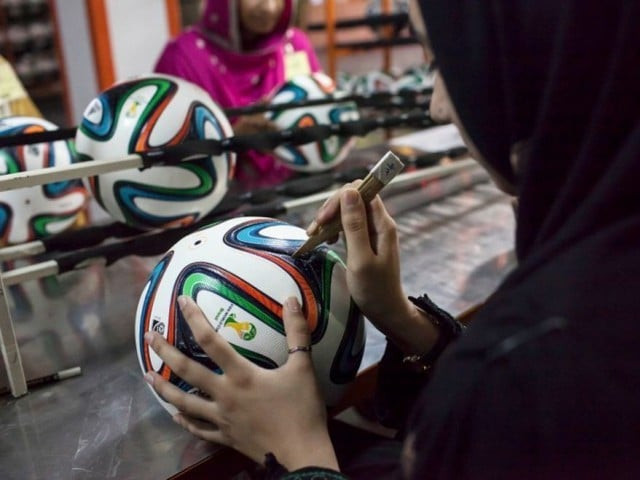Financial motives: ‘End child labour, boost exports’
Use of child labour has harmed Sialkot’s football industry

Use of child labour has harmed Sialkot’s football industry. PHOTO: REUTERS
Pakistan has ratified eight core conventions of the International Labour Organisation (ILO), something that even China and India haven’t done. Pakistan has even made provisions in its laws to implement the conventions. “Yet there are several gaps that need to be filled if Pakistan hopes to retain its GSP Plus status and encourage export of its products,” Belinda Chanda, a representative of the ILO, said at a roundtable conference held on Tuesday.
Chanda’s presentation highlighted the demise of the football manufacturing industry in Sialkot due to child labour in its supply chain. She said the United States had withdrawn the GSP Plus status it had accorded Pakistan in the ’90s because of the same problem. She said prevalence of child labour had played a major role in the closure of SAGA Sports in 2006 and Disney’s withdrawal from the country in 2013.

Other members of the conference highlighted the issue of eliminating child labour from sectoral supply chains.
Employers Federation Pakistan president Khawaja Nauman stressed the need to eliminate child labour from various sectors in light of the GSP Plus given by the European Union. He said the carpet industry and the soccer ball industry in Sialkot had showed successful interventions and the findings and methodology from their case studies should be implemented in other sectors as well. He said eliminating child labour from export-oriented industries was even more important.
Dr Saifullah Chaudary, a consultant with the ILO, discussed various interventions made by the ILO. He said one of the most important considerations in the process was encouraging public-private partnership, which identified employers as major stake holders in the process.
He said the ILO had set up the International Monitoring Association for Child Labour (IMAC) in which employers had paid for the staff and infrastructure to set up an independent monitoring association run by the ILO. He said they had initiated a micro-credit scheme to make up for the loss of income for families.
Chaudary said involving local communities had also played a major role, since awareness and understanding of the issue was important to prevent the re-emergence of child labour. He said they had formed monitoring committees at the district level and a special women’s committee to prevent child labour.
He said after assuring the international community that there was no child labour in its supply chain, the sports industry in Sialkot had increased its earnings. He said in 2003, its export earnings stood at Rs113 million, whereas in 2014, it had risen to Rs196 million. He also spoke about the Brazuca football which was used in the 2014 FIFA World Cup in Brazil which had been manufactured in Pakistan. He said it showed how far the industry, which was on the verge of dying in the ’90s due to export bars, had come. Chaudhary said since technological innovations had decreased demand for material made in the country, it was necessary for Pakistan to eliminate child labour if its industry ever hoped to compete in the international market. The conference was organised by the Employers’ Federation Pakistan and ILO. It was attended by workers’ representatives, employers and government officials.
Published in The Express Tribune, July 1st, 2015.



















COMMENTS
Comments are moderated and generally will be posted if they are on-topic and not abusive.
For more information, please see our Comments FAQ